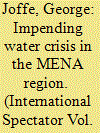| Srl | Item |
| 1 |
ID:
080017


|
|
|
|
|
| Publication |
2007.
|
| Summary/Abstract |
Europe's reactions to its recently-constituted Muslim communities reflect its implicit self-image of cultural homogeneity, despite a long tradition of cultural adaption. This, in turn, is a facet of the persistance of an Orientalist vision which stimulates its opposed mirror-image, Occidentalism or Orientalism-in-reverse, as those communities react with a sense of profound alienation. The two interact to generate the cultural and political confrontation that typifies inter-communal relations today, constructing a new inter-communal socio-political boundary that could harden into a permanent divide of mutual hostility. It is this, far more than globalised salafi-jihadism, that explains the political extremism confronting European states today
|
|
|
|
|
|
|
|
|
|
|
|
|
|
|
|
| 2 |
ID:
105139


|
|
|
|
|
| Publication |
2011.
|
| Summary/Abstract |
Libya has been ruled for decades as an unrelenting autocracy: there has been little space for political competition, despite Colonel Gaddafi's belief that such a system exemplified 'perfect governance'. The regime's rapid loss of control in the first half of 2011 is explained by the geography of power in Libya, which splits the country between east and west, and by the inability of such an autocratic regime to make concessions to popular demand. Can the new interim council in Benghazi wrench control from Tripoli or will Gaddafi be able to resist change, despite the determination of the international community?
|
|
|
|
|
|
|
|
|
|
|
|
|
|
|
|
| 3 |
ID:
147932


|
|
|
|
|
| Summary/Abstract |
In many respects the worsening water scarcity in the Middle East and North Africa has become an object-lesson in the water crisis facing the wider world as climate change becomes a reality. Although northern and southern temperate zones are likely to see increases in precipitation, the equatorial region will face increasing desertification as access to water declines in the face of continuing demographic growth. Competition over increasingly scarce resources will have major geopolitical and security implications and the Middle Eastern and North Africa region will act as a paradigm of what happens in a biome of water scarcity.
|
|
|
|
|
|
|
|
|
|
|
|
|
|
|
|
| 4 |
ID:
051953


|
|
|
| 5 |
ID:
049848


|
|
|
|
|
| Publication |
London, Frank Cass, 1999.
|
| Description |
282p.
|
| Standard Number |
0714649392
|
|
|
|
|
|
|
|
|
|
|
|
Copies: C:1/I:0,R:0,Q:0
Circulation
| Accession# | Call# | Current Location | Status | Policy | Location |
| 041590 | 337.401822/JOF 041590 | Main | On Shelf | General | |
|
|
|
|
| 6 |
ID:
091821


|
|
|
|
|
| Publication |
2009.
|
| Summary/Abstract |
North Africa is notable for the remarkable stability of its political systems despite the increasingly hostile social and economic environment in which they operate. In part this results from their current security engagement with Europe but more important, perhaps, is the shared political culture that informs them despite the great differences between them and their failure to fulfill the principles upon which they were, for the most part, founded. This is, in part, typified by the very similar mechanisms they have each developed to ensure political continuity, based either on monarchical succession or dynastic republicanism. It is less clear, however, that they will be able to resist the most recent challenges arising from Islamist social movements, although the new political dispensations that might emerge may not be so very different from their predecessors.
|
|
|
|
|
|
|
|
|
|
|
|
|
|
|
|